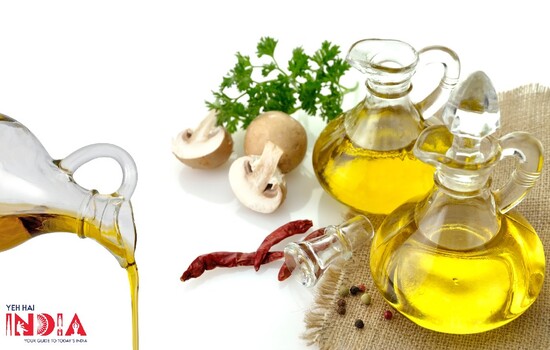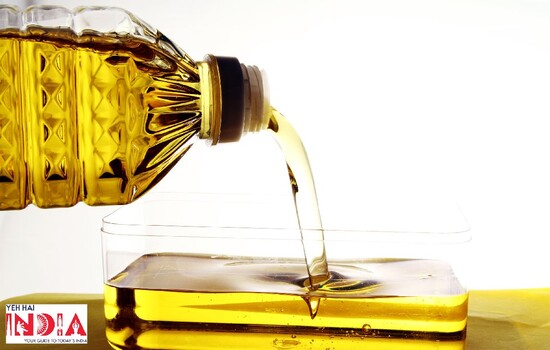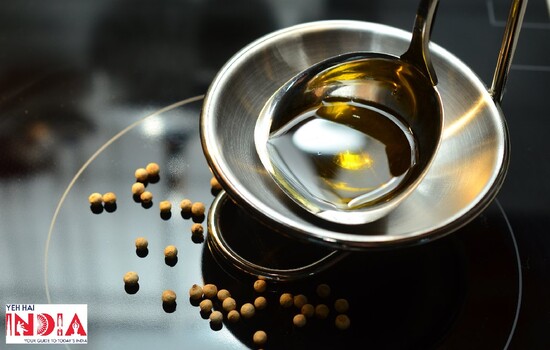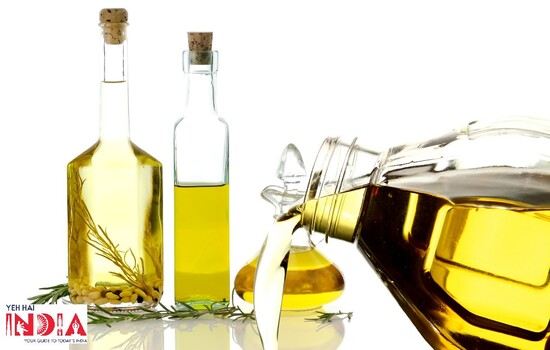‘Refined vs Unrefined Oil‘ has been one of the ongoing debates in the food industry for as long as refined oils came into existence.
Cooking oil is an essential component of Indian cuisine. The use of oils has long been an integral part of daily cooking in Indian households. Indeed, very few foods are available without the use of particular oils in their preparation.
Oils not only bring out the taste and flavour of our food but also define the nature of our health. Usually, there are three types of oils that can be found in the market that are usually opted for kitchen use: cold–pressed oil, refined oil, and unrefined oil.
Though a lot has been clarified roughly in the matter of consuming different kinds of oils and their benefits and flaws that come from using several kinds of oils, there is little emphasis on the distinctions between the two main categories of oils: refined and unrefined.
Two essential factors, health and consumer consciousness, contribute to the variation in their usage when it comes to addressing the difference between refined and unrefined oils.
Refined Vs Unrefined Oil
Before we jump into the differences, it is vital to note how the oils are extracted in the first place.
Process of Oil Extraction

Pressing
Before we jump into the differences, it is vital to note that most of the oils are extracted from a source through a process called pressing. Pressing is an intensive mechanism utilized to extract oils from seeds, flowers, nuts or sometimes vegetables.
When an oil seed is pressed, other oil-soluble components present in the seed also mix with the oil when it comes out. These components include gums, waxes, colourants and some other components of plant or fruit seeds that are undesirable for consumption.
Refining
This raises the need for a refining process, which eliminates these gums and waxes from the extraction and makes oil edible for consumption. Refining can be as simple as filtration to more complex procedures like degumming or acid refining.
Refining does not cause any chemical changes in the oil and does not involve boiling the oil. No chemicals are added to the refined oil which makes it unhealthy. Nevertheless, there might be the addition of some artificial ingredients to make the oil non-perishable and increase its shelf life.
Though most of the seeds need refining after extraction, some oils like coconut do not require the process of refining and can be used directly. On the other hand, some seeds like palm need intensive refining.
Oils like olive oil are also never refined as the process of refining defeats the very purpose of using virgin olive oil.
WATCH OUR VIDEO BY AN EXPERT ON WHICH COOKING OILS TO USE
Recommended Article: 7 Best Natural Cold-Pressed Oils for Daily Cooking
Differences Between Refined Oil and Unrefined Oil
| Refined Oil | Unrefined Oil | |
| Extraction | Extracted by clarifying and sifting raw and crude oil | Minimal heat and no artificial procedures involved |
| Nutrient Loss | Significant loss of nutrients, aroma, and flavour during extraction | Retains natural nutrients and flavour |
| Additives | Artificial additives for aroma and flavour are added | No additives, chemical mixtures, or artificial ingredients |
| Heat Exposure | Exposed to intensive heat during extraction from seeds | Minimal to no heat exposure during extraction |
| Treatment | Subjected to deodorizing and bleaching processes | Not bleached, washed, or deodorized |
| Aroma and Flavor | May have a lighter and less distinct aroma and flavour due to the processing | Retains authentic taste, smell, and essence |
Recommended Story – Cold pressed oils: Are they healthy and would they replace cooking oils?
Refined Oil

Refined oils are the output obtained after clarifying and sifting raw and crude oil by eliminating all the harmful and toxic ingredients after the pressing of seeds. The refined version of this oil is light, pure and free from bad odour.
Extraction of refined oil usually involves the process of heating, which speeds up the process of oil extraction and results in more oil yield. The heat-extracted oil is treated with some artificial ingredients and is subjected to a deodorizing and bleaching process.
Refined oils contain large amounts of Omega-6 fatty acids and PUFAs, or rancid polysaturated fatty acids.
Unrefined Oil

Unrefined oils are oils that are not exposed to any kind of heating and do not involve any artificial improvisations after extraction. In other words, these are the oils that have minimal interaction with heat, filtration and other refining procedures like degumming.
These oils are conserved in their natural state once taken out from the seeds. They are neither exposed to any chemicals nor deodorized after the extraction.
In common terms, unrefined oils are very much suited for consumer needs as they’re authentic in colour, odour and flavour. However, not all kinds of oils are available in unrefined form.
Furthermore, due to the presence of a high percentage of nutrients in them, unrefined oils are popular among Indian customers, as they include a healthy proportion of nutrients such as oleic acids, omega-3, and omega-6.
Which oil is healthy for your consumption?
The authenticity of oil and the proportion of nutrients available in unrefined oils make them highly edible, easy for consumption, and safe for use in your kitchen and for your overall health.

There are only a few types of unrefined oils available in the market leaving the consumers with a limited set of choices. Nevertheless, these limited choices offer a great deal of benefits for your health.
Some Common Refined and Unrefined Oils Available in the Market Refined Oils Unrefined Oils Rice bran oil Mustard oil Canola oil Cold-pressed Avocado oil Sunflower oil Extra virgin Olive oil Soybean oil Cold-pressed Sesame oil Safflower oil Cold-pressed Almond oil Peanut oil Cold-pressed Walnut oil Vegetable oil Cold-pressed Flaxseed oil Grapeseed oil Cold-pressed Ground nut oil Cottonseed oil Extra virgin Coconut oil Corn oil Coconut oil
Potential advantages associated with Refined and Unrefined Oils

Refined Oils
Versatility and culinary uses:
Refined oils have a high smoke point, making them suitable for various culinary applications, such as frying, sautéing, and baking.
Neutral flavour profile:
Used in dishes where the oil’s taste should not overpower other ingredients.
Heart Health:
Some refined oils, like rice bran oil and canola oil, are low in saturated fat and high in monounsaturated fats, which may help reduce the risk of heart disease.
Omega-6 Fatty Acids:
Refined oils, such as sunflower oil and soybean oil, are a good source of omega-6 fatty acids, which play a crucial role in the body’s inflammatory response and cell function.
Unrefined Oils
Flavour Profile and Culinary Uses:
Distinct flavours that can enhance the taste of dishes. For example, coconut oil adds a tropical aroma and taste, while olive oil brings a fruity and grassy note. These oils are commonly used in salad dressings, dips, marinades, and for drizzling over finished dishes.
Nutrient-Rich:
Unrefined oils, like coconut oil and olive oil, retain more natural nutrients, including antioxidants, vitamins, and minerals.
Heart-Healthy Monounsaturated Fats:
Olive oil and avocado oil are rich in monounsaturated fats, which can help lower LDL (bad) cholesterol levels and reduce the risk of heart disease.
Antioxidant Properties:
Some unrefined oils, such as sesame oil and flaxseed oil, contain antioxidants that help protect the body against oxidative stress and inflammation.
Suitability of Oil for Different Cooking Methods

Refined Oils
Due to their high smoke point, refined oils like sunflower oil, canola oil, and vegetable oil are ideal for high-heat cooking methods such as frying, deep-frying, and stir-frying.
They can withstand higher temperatures without breaking down or producing smoke.
Unrefined Oils
Unrefined oils, such as coconut oil, olive oil, and avocado oil, have lower smoke points and are better suited for medium to low-heat cooking methods like sautéing, baking, and roasting.
They can add flavour and richness to dishes when used at lower temperatures.
Cooking Method Refined Oils (High Smoke Point) Unrefined Oils (Lower Smoke Point) Frying Sunflower oil, Canola oil, Coconut oil, Extra Virgin Olive oil Vegetable oil Avocado oil Deep Frying Sunflower oil, Canola oil, Coconut oil Vegetable oil Avocado oil Stir-Frying Sunflower oil, Canola oil, Coconut oil, Extra Virgin Olive oil Vegetable oil Avocado oil Sautéing Sunflower oil, Canola oil, Extra Virgin Olive oil, Avocado oil Vegetable oil Baking Sunflower oil, Canola oil, Coconut oil, Extra Virgin Olive oil Vegetable oil Avocado oil Roasting Sunflower oil, Canola oil, Extra Virgin Olive oil, Avocado oil Vegetable oil
Selecting the Appropriate Oil

Consider Cooking Temperature:
Choose refined oils for high-heat cooking methods and unrefined oils for lower-heat cooking or when a specific flavour profile is desired.
Dish Compatibility:
Consider the flavour of the oil and how it will complement the other ingredients in the dish. For example, use olive oil for Mediterranean-inspired recipes or coconut oil for Asian or tropical dishes.
Nutritional Preferences:
Take into account your nutritional needs and preferences. Refined oils are lower in nutrients but may have a longer shelf life, while unrefined oils retain more natural nutrients but have a shorter shelf life.
In conclusion,
Studying the process of making unrefined and refined oils and the changes it brings to the aroma, nutrient profile, and flavour of the oil, along with the effects they have on our health, makes it easier to make an informed choice for a healthy and disease-free future.
Both unrefined and refined oils possess their own pluses and minuses. Unrefined oils are better from a health perspective, but if you want to spike the flavour and aroma of your food, you can occasionally switch to refined oils.
Start including unrefined oils in your daily cooking to boost your health with a chock-full of nutrients minus any artificial additives, and reserve refined oils for special occasions or recipes to derive the best benefits both versions of oils seem to offer!
It’s important to experiment with different oils and find the ones that suit your taste preferences and cooking style.
Keep in mind that moderation is key, as oils are high in calories, regardless of whether they are refined or unrefined.
Also, Read – Ghee vs Oil? 7+ reasons why you should switch!










